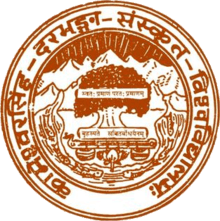Kameshwar Singh Darbhanga Sanskrit University
Kameshwar Singh Darbhanga Sanskrit University (KSDSU) is a state university located at Darbhanga, Bihar, India, dedicated to the teaching and promotion of Sanskrit.
 | |
| Type | Public |
|---|---|
| Established | 1961 |
| Chancellor | Phagu Chauhan |
| Vice-Chancellor | Sarva Narayan Jha |
| Location | , , |
| Campus | Urban |
| Affiliations | UGC |
| Website | www.ksdsu.edu.in |
History
KSDSU was established in 1961, with the scholar Umesh Mishra as its first Vice Chancellor. The then Education minister of unified Bihar, Satyendra Narayan Sinha, announced the instigation of the university. Kameshwar Singh donated his ancestral Anand Bagh Palace to the government of Bihar as a university for the promotion of Sanskrit. Currently, this palace is the head office of the university.[1]
It has held one awareness campaign. Sanskrit scholar and poet Ram Karan Sharma was the vice chancellor from 1974 to 1980.[2]
Manuscript collection
Among the collections of the university are manuscripts on epics, philosophy, vyakarana, dharmashastra, agama, tantra etc. The exceptional collection of nearly 5562 rare manuscripts including six illustrated manuscripts of the Ramayana, Gitagovinda, Srimadbhagavata, Durga Saptasati, etc. The few manuscripts of Vidyapati, Mahesh Thakur composed in their own scripts are among the collection.
The university started functioning as a Manuscript Resource Centre in September 2003. This MRC has documented its own collections, as well as surveyed the areas of Bihar and Jharkhand. It has so far documented 2000 manuscripts, covering 49 institutions and 206 private collections in 13 districts. Paper manuscripts and palm manuscripts are preserved in the university.
Campus
Kameshwar Singh Darbhanga Sanskrit University is located in Laxmishwar Vilas Palace, also known as Anand Bag in Darbhanga.
Postgraduate department
Its postgraduate department deals with Veda, Vyakarna, Dharma Shastra, Darshana, Jyotish, Sahitya and Ayurveda.
Affiliated colleges
- Sidheshwari Laxminath Sanskrit College, Madhubani district
- Jagjivan abhuday sanskrit college, amarpur banka
References
- Umesh Mishra; author Govinda Jhā; at page 60
- Gayatree Sharma (29 December 2008). "'Sanskrit has never been dead'". The Times of India. Retrieved 2 March 2009.